Virginia
You’re listening to Burnt Toast! This is the podcast about diet culture, fatphobia, parenting, and health. I’m Virginia Sole-Smith. I also write the Burnt Toast newsletter.
Corinne
And I’m Corinne Fay. I work on Burnt Toast and run Selltradeplus. I am super excited because today we’re talking about FAT TALK, which is officially out this week. I thought it would be fun to ask Virginia some questions about writing the book and that whole process—because it has been a process.
Virginia
It has been a process. And you have been along for a lot of the process! I appreciate you. I appreciate you doing this. Thank you.
Corinne
I’m really excited to hear a little more behind the scenes and I think our little Burnt Toasties will be excited, too.
Virginia
It’s a little weird to be interviewed on your own podcast, but let’s do it. I’m into it! This is stuff you’re not going to hear in the other media coverage. It is Burnt Toast exclusive content!
Corinne
So, this is your second book. I’m really curious about how the idea for this one came about.
Virginia
After I wrote The Eating Instinct I was doing press and events and talking to people. I was hearing a lot from parents, in particular. It was a little surprising to me because I don’t think of that one as a parenting book, although my motherhood story is in it, but it has a lot of non-parenting stuff, too. But that’s definitely who gravitated to the book.
So, I was hearing these questions over and over from folks. “What do I do about my kid and food and my kid and weight and what the doctor says?” and all the things we always talk about. It became clear to me that people were really saying, “I want my kid to have a good relationship with food. I want them to love their body. I don’t want them to get an eating disorder. But I don’t want them to be fat.” And we can’t have it both ways.
You can’t encourage a child to have a healthy relationship with food and body if we are only allowing certain bodies to have that. That’s where I realized, in a way, The Eating Instinct did not go far enough. It started with food, which I think is the place a lot of people start with this work, but what we had to get to is anti-fat bias. That’s the bedrock of the whole conversation. So I thought, oh, I need to write a book for parents about anti-fat bias. Like what it is, why you have it, how to unlearn it, how to raise kids in a world that throws so much of that at us.
Corinne
That makes a lot of sense.
How did you start the writing process? Was there a first sentence or a first chapter you wrote? Did you make an outline first? Where does it all begin?
Virginia
I actually tried to write a totally different book after The Eating Instinct for a while. That’s something that I think only me and my agent know. I thought I was going to write a book about girl culture and girlhood… I don’t really remember. It didn’t work. So I spent a long time writing that proposal and I knew it wasn’t going to work. I sent it to my agent—and I love my agent, we have a great relationship. But when something’s not working, she does not email me back super fast. Some time went by and it was also COVID. I think I got it to her in early 2020 and then the pandemic hit and everything was crazy. But she was like, “Yeah, this isn’t hanging together as a book. There’s no hook.”
I’m trying to remember when I had the epiphany of like, oh, wait, it’s Fat Talk, that’s the book. Well, originally I was calling it Fat Kid Phobia. But that concept came to me at some point in 2020.
And of course, I had zero child care. I was potty training a two-year-old and house training a puppy and trapped in my house with both of them. So the book proposal was definitely happening around the edges of the chaos of COVID lockdown. But once this book came to me, it was so much clearer.
I spent months slogging through the proposal for the idea that didn’t work. And this proposal I was able to—when we finally got some childcare later in 2020—just bang out in two weeks. It really came together fast. I think that’s often a sign for me that I’m actually headed in the right direction, if writing does not feel super slow and torturous.
In order to sell a nonfiction book, you write a very full proposal that includes an outline. So you kind of have to do an outline whether you like outlining or not. As a writer, I—it will probably not surprise people to know—do like outlining for big projects. I’m a somewhat compulsively organized human being. Corinne knows there’s a lot of spreadsheets in my life, color coded things.
Corinne
Some really beautiful work in Excel.
Virginia
Yes, thank you.
So you do have to do an outline. And I just want to say: Writing a book proposal is the worst. It’s the hardest, most horrible part of the process because you’re basically trying to put together a whole book that you haven’t researched yet. You don’t actually know everything that you need to know. So it feels like you’re making it up and there’s a lot of impostor syndrome.
Because it was my second book, I did not have to write a sample chapter. Usually, you have to write a sample chapter, as well. So that was nice. My agent was like, “They know you can write a book now.”
But you have to write this whole overview that explains what the book is, and who the reader is, and why it matters, and why now, and all of these things. Then you have to do a table of contents and detailed chapter summaries. So I had done all of that and once I had the contract and it was time to start working on it, I did have the outline to work from. I was basically taking it chapter by chapter—except I always leave the introduction for last. That I don’t write until the very end. So the first sentence of chapter one is the first sentence I wrote, which is very linear.
There were other chapters where I started it one way and then threw that out and found a different way. That definitely happens. It’s not so paint by number. But for getting it started, the outline was really, really helpful.
I was also doing all the reporting, finding sources, doing all the interviews. And that was really different this time around because of COVID. I wasn’t doing any in person interviews, really. It was all over Zoom which is such a different reporting experience after doing years of in person reporting, but I ended up really liking it. I could talk to way more people because I didn’t have to travel to them. And unless people blur their backgrounds, you do immediately get dropped into someone’s life in a nice way, whereas if you meet them in a coffee shop or something you don’t always have that sense of them.
Corinne
Yeah, that is interesting.
Virginia
So from January 2021 through June 2022. It was just slogging through chapter after chapter, researching, writing, researching, writing. Rinse, repeat.
Corinne
And while you’re writing, do you have a spot that you like to write? Is it your office? Is it somewhere else? A dreamy Airbnb?
Virginia
God, I wish. No, I am not that romantic writer. I’ve never been to a writer’s retreat. I would love to but I feel like I’m just not cool enough for that. Plus, they don’t usually involve childcare. They seem like something that’s great for single men. If folks know about good writer retreats for moms, hit me up because I would go to one. But no, I write in my office right here where I’m sitting talking to you. This is where it all happens.
I don’t actually like to work outside of my office in my house. I have a funny video from midway through COVID of me working on the couch because, again, we had no childcare, and Beatrix who was two-and-a-half, repeatedly closing my laptop saying, “Mama no work.” Me sobbing like, “But I have to work.” Funny memory. Trauma. Anyway!
I prefer to work in my office and keep that work/life division but often because I’m with my kids after school, I’m bringing my laptop downstairs to finish stuff in the living room while they’re getting snacks. My boundaries are not perfect, but that’s the idea. I do a lot of early morning writing, too. I just find I can get like 2000 words written in two hours in the morning if I start at like 5am. And if I started at 9am, the same 2000 words will take me three days. I don’t understand what it is, just so many more distractions. Something about that early morning time is helpful.
Corinne
Interesting. And what about snacks? Any snacks that made Fat Talk possible?
Virginia
Chocolate chips! Ghirardelli semi-sweet chocolate chips by the bowlful. They are really important to my process.
Corinne
Beverages?
Virginia
Corinne
Oh right, I forgot.
Virginia
This book definitely ran on Diet Coke. So much Diet Coke. Extra toasty cheez-its. When I’m in intense, head-down, book-writing mode I don’t have a lot of time for food prep. So it is very grab-and-go. Oh, and here I have one on my desk right now: Uncrustables. My little snack for later.
Corinne
Not just for kids?
Virginia
No, I think uncrustables are like the unsung genius. They’re tasty. They’re portable. They’re very efficient. If you like a power bar or one of those things, an Uncrustable is the same concept. It’s just peanut butter.
Corinne
Okay, I need to try.
Virginia
They’re delicious. They’re in a little pillow of bread. What’s not to love?
Corinne
Sounds good!
I feel like a really important part of Fat Talk is all the stories and interviews and anecdotes that are within the chapters. I’m so curious about how those work. How do you find people to interview? What are the logistics—you mentioned Zoom? And is it ever super awkward? Because I imagine it would be.
Virginia
Yeah, it’s really changed a lot over the years. This is probably the aspect of my professional life that has been most impacted by the internet and the way we live now.
When I started my career as a journalist, if you worked in women’s magazines, finding we called them “real people stories” was the bedrock of every feature. You always had to have your real people’s stories. Often, at Marie Claire or whatever, it was sending a junior editor like me out into Times Square. There’s a story I did—one of my real, real proud moments as a women’s magazine story writer—was my first coverline piece, which was “I Dumped Him During Sex!” where I found a bachelorette party in Times Square to get their wildest breakup stories, one of which was the girl who broke up with her boyfriend during sex.
Corinne
I could see why that was a coverline. I am buying that magazine.
Virginia
I know, it was very compelling. My editor was really happy with me. I mean, it fell apart fast in fact checking because she was sober when we had to call back to fact check. We did manage to keep it, I think we changed her name because the next day, she was like, “I do not want to be quoted telling that story.” And I was like, “Why? I can’t imagine!”
Traditional journalism was that man-on-the-street or drunk-bachelorette-on-the-street reporting. And obviously, now I live in the woods so that’s not how my life works anymore. Thank God, honestly. That was not my proudest moment.
Then it shifted to doing a lot of call-outs on social media. And it is weird because you feel like you’re casting almost sometimes. You’re like, “I want to write a story about this so I need to find someone who’s experienced this.” And you have to think how to word the call out in order to connect with people who will resonate with the story, but not so that you’re like manipulating who will respond to you. You put a lot of thought into how to explain the story in vague yet enticing terms. I don’t know, it’s very strange.
So for this, it was a lot of me posting. I would do it on my own social media, I would put the call outs on Burnt Toast, so there are a lot of Burnt Toast readers who contributed stories to the book!
Corinne
Oh, cool!
Virginia
But also Facebook Mom groups and different Health at Every Size or fat activism groups on Facebook were really useful. Just trying to find the forums where people people who would resonate with the topics are already talking about this stuff and might have stories that they want to share.
It is interesting, because some people love talking to a journalist and are really excited to open up their lives and some people think they like the idea and then when you actually get on Zoom or on the phone with them, it suddenly feels incredibly invasive. Which is very valid because it is very invasive. You know, it’s really tough. I think that’s the awkward part.
I really care about my sources and I really care about them feeling safe and feeling good about sharing their story, especially in a book like Fat Talk. I even care about that drunk bachelorette and I should not have interviewed her. That was a violation of trust between us, having met in the bar that night. Especially for the type of reporting that this book is, where I was often going back and having multiple conversations with a family, interviewing different members of a family, getting to know them over a few months.
I feel really protective of them and I have to balance that with, I need to ask certain questions, or pull out certain details in order for the story to work and make sense to the reader who doesn’t know them and needs to be brought into this full picture of their lives. So it is a weird tension. The best you can do is just try to make clear that you are trying to do justice to their story. It usually helps for folks to care about the issue and want to help raise awareness. There have been times in my career where I’ve been like, yeah, that was our goal but I don’t know that we achieved it and you still had to tell this really personal story.
The other thing that we did in this book was we changed the names of all the kids and any grownups affiliated with the kids, unless they were someone who had already been public with their story in a different article or something. Because I just really felt—and my editor agreed with this, too—that if you’re 14 and you talk to me about your eating disorder, that doesn’t need to show up in your Google results ten years from now.
Corinne
Totally.
Virginia
We ended up even changing names of people who probably didn’t care, didn’t even have like a super personal story. But I was like, let’s just do it across the board and protect people. I feel good about that.
Corinne
When you go into interviews with these people, do they know what the book is about? Like, are you like “I’m writing a book about anti-fat bias” or are you just like, “I’m writing a book about food.” Do they know your perspective?
Virginia
I feel like that was important for people to understand, because this is a book that will get some pushback. I mean, it just got a great review in the Washington Post which is so lovely and then there are 800 garbage comments in the comment section, just like total dumpster fire of comments. So I did want people to understand this is a book that brings out anti-fat trolls. That was another reason for changing names, right? The last thing I want is any of those people finding these kids or their parents who have been through enough, and bringing that to them. So I would always give a little spiel and sometimes send links to my previous work and my other book.
The traditional journalism rules are like, be super impartial and reveal nothing about yourself and be this blank slate for your sources. And in this day and age and with this kind of project, I feel that is ethically dubious. I think that journalism can have a perspective. Certainly the journalism I do is activism-journalism, kind of a hybrid approach, and people can understand that.
I mean, not every source agreed with me for sure. There was one woman where we had an interview where she was really eager to dismantle diet culture and talk about how it impacted her life and how she didn’t want to pass it on to her kids. And when I circled back to her months later, she was like, “I’m taking my child to a weight loss clinic.” She was in a totally different place with it. And that’s really heartbreaking, but that’s her story and her right, of course.
Corinne
Now that the book is out there, do you have a favorite chapter?
Virginia
That is really hard, Corinne! That’s like do you have a favorite kid or a favorite book.
Corinne
Okay, okay.
Virginia
I don’t know. Do you have a favorite chapter?
Corinne
I would have to revisit the table of contents, but there are definitely stories that I read that have really stuck with me.
Virginia
I’m curious which ones.
Corinne
Definitely the one about the parents who were locking up Oreos.
Virginia
Yeah. The lockbox.
Corinne
I have spent a lot of time thinking about those kids and that family.
Virginia
That family was amazing to work with. They were really open. I got to interview the mom, the dad, and both kids, and we’ve stayed in touch. They taught me a lot. That’s the “Snack Monsters and Sugar Addicts” chapter. I also really love chapter 11: “I Got Taller and Gymnastics Got Scarier,” about anti-fatness in youth sports and dance. (Read an excerpt from Chapter 11 here.)
Corinne
I like that one, too. That one was really good.
Virginia
I was nervous to write it because I did feel like I had to check a lot of my own biases, as someone who hates sports and never played sports and never wanted to play sports and don’t really understand the function of sports in our society as a force for good. I did have to sort of dig deep because I just want to be like, “it doesn’t matter. Just don’t play sports. They’re terrible.” Because that’s not where most people are on that topic.
And so I had to really think about like, Okay, what do sports offer kids in terms of relationships with their bodies? Like, what’s positive about it? Oh, wow, fat kids are actually missing out on a whole ton of things because of this. And also, let’s talk about all the toxicity and the hustle culture and deciding that kids bodies are this tool for coaches to manipulate however they want. There’s so much there.
Are you a sports person? I don’t know this about you.
Corinne
I played a few sports, at least at the beginning of high school. And then I kind of dropped out of them all by my senior year when I was just like, “I’m more of like an arts person.” But I do kind of regret it because I do feel like you get a lot from sports. Like, I feel like there’s camaraderie and also just the opportunity to find joy in moving your body, which I think I did and really lost for a while.
Virginia
I don’t think I ever experienced that as a kid because I was unathletic and self-labeled as unathletic and then reinforced as unathletic. Gym class was just a torture zone to me. Like, I was mortified to be there all the time. From really early on, from like first and second grade, I can remember just being horrified of gym class.
Corinne
Yeah, there are some really young kids who go to the gym I go to—I think they work with some high school programs? And I always just wonder, what if I had discovered this when I was 17 instead of 37?
Virginia
I do feel like the focus on team sports is really misguided in that way, because so few adults can play team sports. If we’re really trying to foster a love of movement for kids, shouldn’t we be focusing on things that you do in an individual way? That you can easily do as an adult? That are accessible?
Corinne
Or team sports that are for the joy of it rather than like, can we beat the next town over and anyone who can’t run a mile in six minutes is going to be cut and you should be barfing after every race or whatever.
Virginia
There’s a funny thing. It’s not in that chapter actually, it’s in the dads chapter. But one of the dads I interviewed talked about being a wrestler in high school and how in order to make weight they would chew tobacco and spit. Because if you could spit enough, you could lose water weight. And I was just like, I mean, if there was ever an example of how youth sports are not centering children’s health! Because this was a totally fine practice, like his teachers would be like, “Great. Just go sit in the corner. You got to spit because we got to go to states.”
Corinne
What about other highs and lows of writing fat talk? Are there times where you were like, “This is amazing. I can’t believe I am doing this.”? And I’m sure there were also times where you were like, “I’m giving up.”
Virginia
More of those, I think. I don’t love all the book writing motherhood metaphor stuff, but it is a little bit like childbirth, where I think I’ve blacked out a lot of it. Like, I am like talking to you about the schedule and I’m like, how was I getting that done? I don’t understand.
Virginia
Chapter one was really hard to write. Chapter one is the longest chapter in the book. Folks are going to have heard it on last week’s podcast because we’re doing the audiobook excerpt. And it was a lot of reporting. It was really when I sat down and wrestled into the ground the arguments about weight and health and like how the childhood obesity epidemic is in many ways a government and media creation. I think I was really afraid to wrap my head fully around all of those arguments before I did that chapter. Then once I did it, the first draft of it was like 20,000 words long. It was so long. And it was like, I gotta rein it in a little. Some of this is actually chapter two.
But I remember just feeling like, okay, now I can get through the rest of this book. I think, for so many of us, as you work your way through being anti-diet and getting into fat liberation and all of this. There are these third rail arguments that you’re always afraid to have, where you freak out when people say this. Like, what do I say when someone says, But what about health? And that was the chapter. I was like, I have to look at all of those and figure out how to knock them all down. And I wasn’t sure I could before I got into it. So that was a high.
The lows were more related to the stress of writing a book on top of running a newsletter on top of—I think for at least the first chunk, I was still freelancing. And having two children who I’m supposed to be raising. The time management stuff. There was a real womp-womp moment. I turned in the manuscript, the first draft of the manuscript at the end of June 2022 and I thought I wouldn’t have to start revises until September so I was like, I’m gonna have my summer. It’s going to be so chill. This is great. I can come up for air. I was very burned out. It been like so much work to get that book written. And then they were like, so Labor Day for revises? And I was just like, I oh my god I have to get back into it so fast. I had a week of decompressing before my editor sent the draft back and was like, “Okay, now we need…”
And thankfully her notes were pretty minimal. That was like when I had you read it, your notes were excellent. And Amy read it and gave me a lot of notes and my friend Lynn Steger Strong, who is a brilliant novelist, read it. Then I was taking everybody’s notes and trying to put it all back together. It wasn’t torture, but I was aware of being very at capacity at that point. So that was a little bit of a low.
I think you think of book writing as just writing the book and done, but there’s all the prewriting and proposal, then there is writing, and there is revising. And then pretty much as soon as you’re done with revising, it’s time to start planning for the launch.
Corinne
What about anyone whose work really influenced this book?
Virginia
Every major fat activist, for sure. You know, Marilyn Wann, we’ve talked about our love for her. Ragen Chastain. Aubrey Gordon, obviously. Sabrina Strings, Da'Shaun Harrison, Marquisele Mercedes. There is just a list of people that I’m constantly learning from. In terms of thinking about the structure and the writing of the book, I think Peggy Orenstein’s journalism is a model that I use a lot. Her Girls and Sex and Boys and Sex were so well done. The way she balances narrative and argument is something I’ve really studied a lot and try to model my work on. I think it’s really easy for these books to either be all polemic and rant or very research heavy and dense and hard to get through. I think what I bring to the table is the narrative piece. I think a lot about how to weave it all together. And yeah, Peggy’s work is a big influence on me for that.
Corinne
Yeah, that makes sense.
If you could ask one person in the world to read this book who would it be?
Virginia
I feel like it’s Michelle Obama.
Corinne
Oh, I love that answer.
Virginia
But I think she’s going to be mad at me about chapter one. She is the most well known and obviously the person with the most influence in terms of progressives who centered on childhood obesity as their fight, when they should have been fighting poverty and inequities. I talk a lot about how that contributed to all of the fearmongering around childhood obesity, that we all grew up with and that parents today carry so much around. I also really try to do justice to the fact that her own body has been the source of so much scrutiny and racism and anti-fatness. And this is something my sensitivity reader Dom was really helpful in making sure I really pulled out in the draft. Because I think it makes sense with the narrative that she grew up with around bodies and then the way her body and her daughter’s bodies were like products for our country to dissect was horrific.
And also, I would love her to keep pushing on this. I see it now in her new book, the way she still talks about bodies. There’s a very, like, girl boss kind of attitude towards that. And I’m just like, Oh, we’re not quite there. And Michelle, you could do so much good on this. I would just love her to become an anti-fat bias activist.
Corinne
Well, as we discussed, there’s a big part of the book beyond writing, which is editing. Is there anything that didn’t make it into the book that you were really sad about leaving out?
Virginia
The funny thing is, I’ve written thousands of words that didn’t make it into this book. I always copy and paste and drop them into another document because at the time, I’m like, this is so important and I can’t believe I’m cutting it and I’m going to need it. It’s just so painful to me to take this out. And now I cannot tell you one thing that is in that folder, like I have no idea.
Corinne
Mmm, interesting.
Virginia
I know I cut some stuff that felt super important and now it’s just gone.
But what I will say was harder was I did interview lots of people whose stories didn’t make it into the book, like didn’t even make it into the first draft. And I do think about some of those. There are a lot of those narratives that I would have loved to include. Like I interviewed this really great trans dad about his body journey and how diet culture shows up in the trans community and his relationship with his kids and all of that, and it just didn’t end up fitting. The dads chapter ended up being about straight white dads. (Read an excerpt of the dads chapter in The Atlantic!)
I wanted to really deal with that cis male Peter Attia hyper macho narrative and I didn’t find another space to get into trans dads. And it felt weird to do a chapter just on trans dads. And you know, that’s not my story to tell. That’s one interview I was just thinking about the other week. I was like, oh, I didn’t get him in and that was such a great conversation, and it did influence all of those conversations. There’s a mom in Indiana, I’m thinking about, too, who didn’t make it in. There was fascinating stuff about her childhood growing up poor and food insecure. And all these different stories, the essence of them still really informed the book. But this is a really long book. It’s like 120,000 words. And if I had included everyone I wanted, it would have been like 200,000 words, and no one would read it.
Corinne
Don’t be disheartened! It’s an easy read.
Virginia
Thank you, Corinne. I appreciate that.
Corinne
It moves along.
Virginia
It’s a zippy read, right?
Corinne
It’s a zippy read. There we go.
Okay, well, I almost hate to ask you this. But how long before you start thinking about your next book? Or you already thinking about it?
Virginia
Ahh, no. No.
Corinne
It’s like asking seniors what they’re going to do after they graduate.
Virginia
Not okay with that question.
My children feel really sorry for me that I don’t write children’s books. And they bring this up often. At dinner the other night, Beatrix said to me, “Are there no pictures in Fat Talk?” And I said, “there are no pictures.” And she goes, “and there are no pop-ups?” And I was like, “there are no pop-ups.” And she was like, “really?? Not one pop-up? Maybe a little pop-up?” She was so sorry for me.
Corinne
I love that so much.
Virginia
She just made a book in kindergarten that she brought home to show me that does have pictures and a pop-up page.
Corinne
Just a suggestion, mom.
Virginia
Yes. She just really wanted to be clear that it’s nice that I have this book, but she has published hers with pop ups and I just haven’t quite achieved that yet.
Corinne
Is this your way of telling us you’re going to write a children’s book with pop ups?
Virginia
I think I’m absolutely not going to do that. But I will say one of the questions I get asked most often is about this gap in kid’s lit. I think it’s improving, to be honest. I think we’ve had lots of great children’s and YA authors on the podcast, that we are getting more and more options. But I haven’t seen a Fat Talk for kids. I don’t think it would have pop-ups. I think it would probably be for older kids, but that’s something I’ve pondered, how to engage kids directly in questions of anti fat bias.
Corinne
I love that idea.
Virginia
Yeah, but I’ve gotten no further with it. I mean, writing for kids is a whole different genre and skill set. So bottom line, no. I have no ideas. There are things kicking around. My daughter would like a pop up book. That’s as far as I’ve gotten.
Corinne
Bottom line, please leave me alone.
Virginia
It is a terrible question.
Corinne
I know, I’m sorry.
Virginia
I’m just trying to get through this. It took me a while after The Eating Instinct to find this book. I’m going to just trust that the next one will show up eventually.
Corinne
I can’t wait to hear what it is when it happens.
Virginia
Eventually, somehow. With or without pop-ups.
Thank you for doing this. This was really fun! Thank you guys so much for listening to Burnt Toast.
Corinne
If you’d like to support the show, please subscribe for free in your podcast player and leave us a rating or review. These really helps folks find the show.
The Burnt Toast Podcast is produced and hosted by me, Virginia Sole-Smith. You can follow me on Instagram or Twitter.
Burnt Toast transcripts and essays are edited and formatted by Corinne Fay, who runs @SellTradePlus, an Instagram account where you can buy and sell plus size clothing and also co-hosts mailbag episodes!
The Burnt Toast logo is by Deanna Lowe.
Our theme music is by Jeff Bailey and Chris Maxwell.
Tommy Harron is our audio engineer.
Thanks for listening and for supporting anti-diet, body liberation journalism!

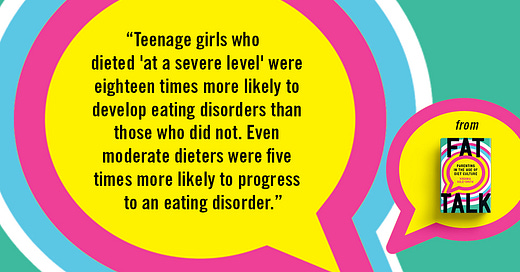
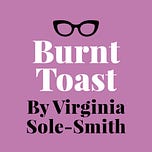


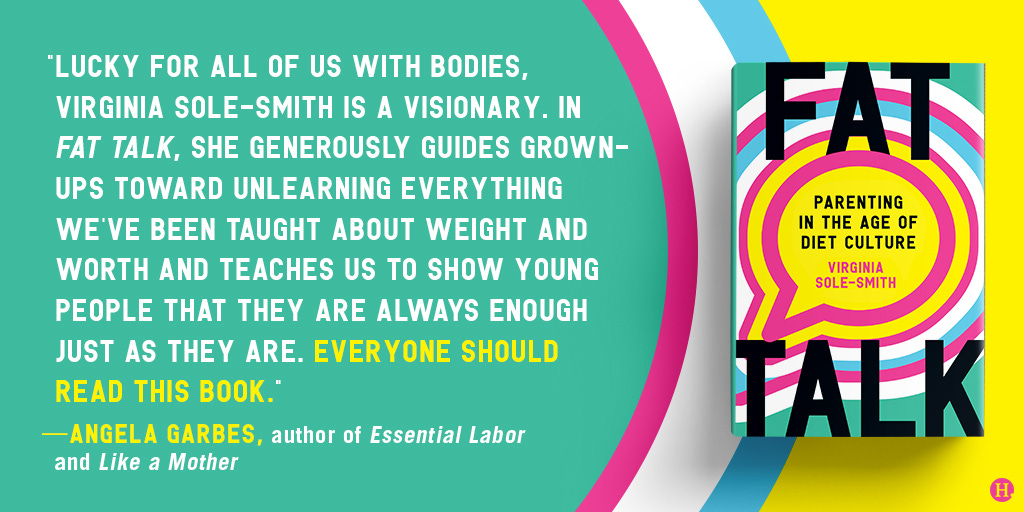


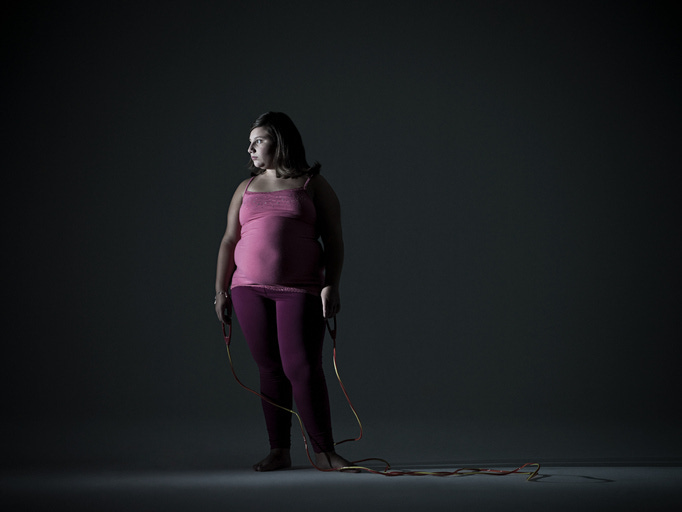


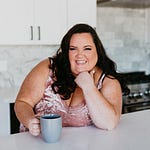
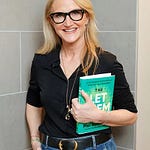
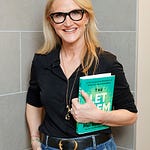
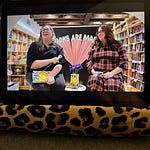

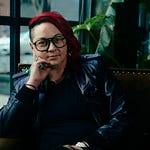


Share this post